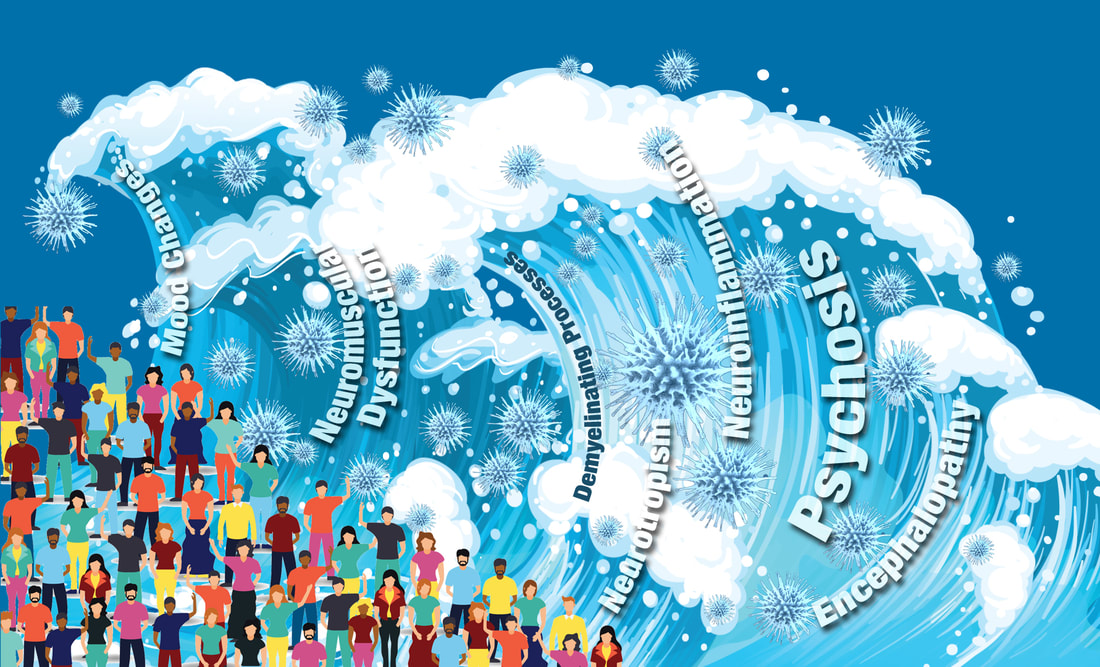|
We have long known about a link between pandemics and neuropsychiatric disease. Dating back over a hundred years ago, this was referred to then as “influenza psychosis.” Many of my colleagues and I believe that after this worldwide COVID 19 pandemic, we potentially are going to see a tremendous rise in post-infectious neuropsychiatric presentations. History informs our concerns. By 1919, the Spanish Flu pandemic had spread influenza to a third of the world's population at the time, approximately 500 million people. Psychiatrist Karl Menninger at Boston Psychopathic Hospital was treating people who'd recently been infected and recognized that these patients had much more than a typical flu. In a paper that studied 100 cases he saw over a three-month period, Menniger described manifestations of extreme mental disturbances; in fact, over half of his patients had some sort of psychosis and almost two-thirds had hallucinations. The Spanish flu also taught us about a post-viral form of Parkinson’s as a late-presenting feature of encephalitis lethargica. Widely varying acute manifestations included extrapyramidal disorders, myoclonus, eye movement disorders, paralyses, delirium, mood changes, inverted diurnal rhythms, and catatonia. Major pathological changes involved the substantia nigra, globus pallidus, and hypothalamus. A symptom-free recovery period was often followed by post-encephalitic disturbances, typically diagnosed as Parkinsonism in adults and conduct disorder in children. Occurrence of depression, mania, obsessive-compulsive disorder, and hyperactivity in post-encephalitic patients anticipated current concepts of the role of the basal ganglia in mood, personality, and obsessional syndromes."
In view of these and other connections, scientists began to look more closely at the link between viruses and neuropsychiatric/neurological diseases about which I previously have written in our blog section. (https://www.suzannegazdamd.com/blog/what-causes-our-body-to-attack-the-mind) Viruses have now been linked to every neurodegenerative disease from autism to Alzheimer’s disease. A new field of immunopsychiatry has emerged in the last few years where in a subset of patients there is an inflammatory root to their brain disease. We see this clearly in PANS and PANDAS where an infectious trigger(s) provoke an immune response in the brain. Will there be a “tsunami on top of the tsunami” that follows? In this recently published article, "Are we facing a crashing wave of neuropsychiatric sequelae of COVID 19? Neuropsychiatric symptoms and potential immunologic mechanisms." the authors Emily A. Troyer, Jordan N. Kohn, and Suzi Hong "discuss currently available evidence of COVID 19 related neuropsychiatric sequelae while drawing parallels to past viral pandemic-related outcomes. Past pandemics have demonstrated that diverse types of neuropsychiatric symptoms, such as encephalopathy, mood changes, psychosis, neuromuscular dysfunction, or demyelinating processes, may accompany acute viral infection, or may follow infection by weeks, months, or longer in recovered patients." In confronting the tsunami of neuropsychiatric disease post-COVID 19: 1. It’s important to understand the post-viral mechanisms that lead to neurodegenerative/psychiatric disease including: viral invasion into the central nervous system (CNS); neurotropism (where a virus invades the brain and can many times remain dormant there until something triggers their activation again); deregulation of cytokines and widespread, out-of-control neuroinflammation; molecular mimicry; immune dysregulation from infectious triggers that last long after the systemic infection has cleared the gut-brain axis; and alteration of the gut by viral invasion when viruses may have substantial and intimate interactions with the commensal microbiota. (https://www.frontiersin.org/articles/10.3389/fimmu.2019.01551/full) 2. Education is key and I will be talking and writing more about this potential link in upcoming neurology blogs and scientific articles. Given the global burden of COVID 19 as it stands today, even a fraction of these infections that result in future neuropsychiatric cases will be significant. 3. We must learn to control our fear response as fear, panic, anxiety and lack of sleep all negatively effect our immune systems. We really are more in control of our health than we may realize. And learning the basics and foundations of good health starting with: nutritious diets; getting regular sleep and moderate exercise; reducing the toxic load on our systems and decreasing our exposure to chemicals, pesticide laden foods, GMO's, and EMFs; adding certain key supplements; lowering stress and making positive lifestyle choices are the first and most important steps toward your wellbeing and are an integral part of our integrative medicine therapeutic care programs. 4. Finally, we need to take a closer look post-COVID at the pros and cons of traditional vaccines and all current research. There are many reports of Guillain–Barré syndrome (GBS), both the subacute/chronic and progressive types, post-vaccination encephalopathy and subclinical myelopathies among other disease-initiation following vaccination for influenza, particularly in regard to the 1976 swine flu vaccination. Never before has integrative medicine been so greatly needed to address in conjunction with conventional medicine this crashing wave of chronic disease and consider its role in helping to arrive at viable solutions should we experience a rise in neuropsychiatric and similar disorders. There is not simple one step to treating or preventing any disease. It does indeed take a village and I know that together we are and will continue to be that village for all those who need us. In health and hope, Dr. Suzanne Gazda References: Menninger K.A. “Psychoses associated with influenza, I: General data: Statistical analysis.” Journal of American Medicine Association. 1919;72:235–41. Kępińska, A., Vernon, A., et al. “Schizophrenia and Influenza at the Centenary of the 1918-1919 Spanish Influenza Pandemic: Mechanisms of Psychosis Risk.” Frontiers in Psychiatry. (February 2020). https://doi.org/10.3389/fpsyt.2020.00072 https://www.sciencedirect.com/science/article/abs/pii/S0920996497000923 https://www.vice.com/en_us/article/g5x3gq/link-between-pandemics-and-psychosis-spanish-influenza-and-psychotic-disorders https://www.ncbi.nlm.nih.gov/pmc/articles/PMC3530294/ “Encephalitis lethargica: Lessons for contemporary neuropsychiatry.” Journal of Neuropsychiatry and Clinical Neuroscience. 7 (1995), pp. 125-134, Poser, C.M. “Neurological complications of swine influenza vaccination.” Acta Neurologica Scandanavica. 1982;66:413–31
0 Comments
Your comment will be posted after it is approved.
Leave a Reply. |
AuthorDr. Suzanne Gazda, Integrative Neurology Archives
February 2024
Categories |

 RSS Feed
RSS Feed